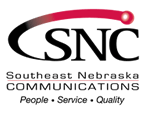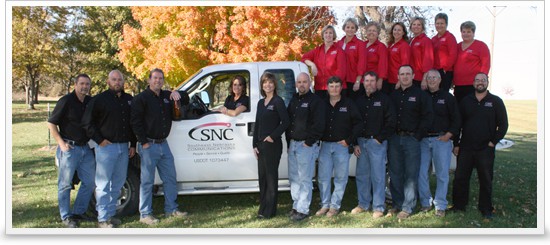Mom & Pop Phone Companies Install Fiber to the Home Service Larger Providers Claim They Can’t Afford
Richardson County, Nebraska is classic rural Americana. Fixed at the very southeastern tip of Nebraska, the county’s gently rolling countryside offers a break from the relentless flat prairies in nearby Kansas. Agriculture, cattle and hog farming are important to the local economy. Large farms grow corn, alfalfa, and wheat, but the area’s 170 growing days also support a significant apple crop as well. Towns within the county range from the tiny Barada, population 28 up to the county seat — Falls City, population 4,671.
With a climate than can deliver temperatures well under zero in the winter and into the triple digits in the summer, tourism isn’t this part of Nebraska’s strength. But its location, culture, and cost of living are for those who live there.
Originally founded in 1857, Falls City served as a major transit point for escaping slaves caught up in the Kansas-Nebraska Act controversy, one of the many disputes that eventually led to the Civil War. Like most small towns of the time, growth came with the arrival of the railroads. First, the Atchison & Nebraska Railroad in 1871 and then the Missouri Pacific in 1882.
The population peaked in 1950 at 6,200, but the town has held its own thanks to the self-sufficiency of its residents and local government.
Falls City is a unique community among thousands of small communities across the heartland and beyond.
The local economic development team promote Falls City’s possibilities as a strategic transit and shipping center. Regionally, Richardson County is just an hour or two away from Kansas City, Missouri, Topeka, Kansas, and Omaha and Lincoln, Nebraska. Centrally located, the area offers two day shipping possibilities to most points of the country.
The municipal government owns and operates the local water, gas, electric and waste treatment facilities, which charge rates lower than other communities in Nebraska. Time Warner Cable’s Nebraska division offers service in most parts of town, and the local, family-owned Southeast Nebraska Communications (SNC) started providing phone service in Falls City, Rulo, Stella, Shubert, Verdon and Salem, as early as 1906.
 SNC, which was founded by Edwin H. Towle, began with an attitude of innovation — providing the best, most modern service possible for southeastern Nebraska. Simply providing “good enough for rural residents” service typical among larger providers was never a part of the company’s philosophy. The company grew through its innovation, and today leverages all it can out of its copper cable network. The spirit of innovation that began with Edwin continues today at SNC through family member Dorothy J. Towle, who serves as president of the company.
SNC, which was founded by Edwin H. Towle, began with an attitude of innovation — providing the best, most modern service possible for southeastern Nebraska. Simply providing “good enough for rural residents” service typical among larger providers was never a part of the company’s philosophy. The company grew through its innovation, and today leverages all it can out of its copper cable network. The spirit of innovation that began with Edwin continues today at SNC through family member Dorothy J. Towle, who serves as president of the company.
Towle and other company officials recognize the days of copper wire phone networks remaining relevant in today’s telecommunications marketplace are seriously numbered.
SNC made a decision remarkable for a phone company of its size — it was going to rewire Falls City for fiber optics, straight to the home, at no additional charge to residents and area businesses.
Last July, it stunned the community with the news southeastern Nebraska would have access at speeds cities ten times larger could only dream about.
SNC is investing between $8-10 million in the project, which will reach most city residents by its completion in 2011. The company is constructing the network with capital improvement funds they’ve conservatively saved year after year, and believes it’s a great investment because of future revenue possibilities fiber optics can bring. This isn’t a company that worries about pumping up stock prices, boosting dividend payouts, or lavishing executives with enormous pay and benefit packages. SNC employees live and work in the community and want to enjoy the fruits of their labor.
Operations Manager Ray Joy told the Journal Star the new system will be capable of offering 1,000Mbps to a house. Right now, SNC offers DSL service at 3-7Mbps.
The company is still working out precisely what speeds it will offer residential and business customers, but they will be far better than what is possible from aging copper wiring. Best of all, it’s future proof, which SNC believes will save them plenty in the long run. Upgrading fiber networks just takes a different type of laser — no rewiring required.
SNC first considered wireless technology to serve the community, but rejected it because of insufficient bandwidth capacity. Fiber’s expandability the choice much easier for the company.
Of the 460 cities and villages in Nebraska, only 11 currently have fiber to the home, and Falls City will be the largest in the state.
Falls City Economic Development and Growth Enterprise, the local economic development team, hopes to promote Falls City’s fiber as perfect for new digital economy businesses, creating new high-paying jobs for area residents.
Current entrepreneurs who live in Falls City are already convinced.
Karissa Watson, owner of Kissa’s Kreations, a Web and graphic design service, told the newspaper she is looking forward to the conversion.
“From what I understand, it will be 20 times faster, but I also think the quality will be better because it’s a dedicated versus a shared service,” she said.
Watson wants faster service in order to increase her efficiency. Slower broadband speeds can cause long waits for businesses moving data back and forth.
Watson and other Falls City residents are being kept informed about the progress of the project in quarterly newsletters sent by the company. A contracting firm, RVW, Inc. of Columbus, Nebraska is doing the work. Their technicians are personally visiting every home and business owner before digging begins in a neighborhood, and remain available to address any concerns residents have after work is complete.
SNC markets themselves as locally owned and operated, which is why personal contact with customers is critically important to the company’s success. Newsletters allude to their nearest competitor, Time Warner Cable, as not exactly being local. SNC touts their local customer care office, staffed by area residents, local call centers that are answered by “real people,” and a service staff that can often respond to service outages on the same day.
“Unlike some companies, we don’t play games with low teaser rates that go up later,” sums up the company’s marketing attitude.
SNC’s fiber upgrade also could eventually protect them from Time Warner Cable’s relentless drive towards product bundling, which can cost the telephone company landline business. The cable company can also beat SNC’s broadband speeds on the copper wire network. With an upgrade, SNC could eventually offer customers a cable-TV alternative, taking the competition back to the nation’s second largest cable operator.
Although 75 percent of the six million Americans served by fiber-to-the-home projects are Verizon FiOS customers, there is considerable growth in fiber deployment among small mom and pop and municipally-owned phone companies. That’s remarkable because they lack the economy of scale and financial resources larger telephone companies enjoy. But those small phone companies aren’t caught up in debt, endless mergers and acquisitions, stock price games, and ludicrous compensation for a handful of executives. For customers of Qwest, Frontier, Windstream, and CenturyLink, fiber remains an elusive dream.
The Journal Star covered several other phone companies with fiber projects in Nebraska:
Cambridge, in southwest Nebraska, also has FTTH technology to serve a population of just more than 1,000.
“We’re very excited,” said Cambridge Economic Development Director Adela Taylor, who called it the “infrastructure of the future.”
She said the fiber optic system was the initiative of the local telephone company, which has been very pro-active over the years in bringing the newest technology to the town. She noted that Cambridge was one of the first towns to have Internet service back in 1993, as a pilot project.
Three River Telco in Lynch is in the midst of a three-year project to install FTTH technology. The company serves about 1, 250 customers in Lynch, Verdel, Springview, Johnstown and Naper in north-central Nebraska.
General Manager Neil Classen said Three River received a $19 million federal loan from the Rural Utilities Service to replace its copper wire system with fiber optics. The company wanted to provide the latest services to customers, including transmitting television signals via Internet protocols.
Classen said the fiber optic system will provide customers with a more reliable communications system and a lot more bandwidth than the existing copper wire network. He said the price tag could be less because fiber optic technology has improved and become more cost-effective.
Windstream serves several Nebraska communities, and for those customers, the news is less exciting. Windstream has limited itself to installing small amounts of fiber in new subdivisions.
Brad Hedrick, Windstream vice president of operations for Nebraska and Missouri, said installing fiber optics is an extremely expensive proposition and Windstream has no plans to connect every home and business as Falls City is doing.
But he told the newspaper if the federal government wants to kick in federal funds to help small communities convert, Windstream will consider it.
Windstream cannot deliver fiber to the home to their customers, despite $2.997 billion in revenues for 2009. But a family-owned phone company in Falls City, a telephone company in Cambridge serving 1,000 residents, and Three River Telco in Lynch all can.


 Subscribe
Subscribe



Of course, the paper seems to miss the obvious question:
What would happen if SNC or Three River tried to expand their broadband fiber business to a Windstream-controlled area?
The answer to that question is why we are so far behind in broadband deployment.
Bravo to SNC, proving what a dedicated capitalist company can do on its own.
Just a few notes: SNC likely has cheap access to bandwidth, with Kansas City a stone’s throw away. This will help them immensely when Time Warner Cable decides to upgrade to DOCSIS 3 in their area; SNC will be able to grab cheap bandwidth from Cogent (and soon Hurricane Electric) and premium transit from Level3 at relatively low prices per megabit. Qwest and a few other providers are also in KC. I’m betting that SNC had to make the move to fiber; if they didn’t they would see business erose to next-to-nothing thanks to Time Warner Cable’s efforts. 3-7 Mbps… Read more »
Neb has a STUPID amount of dark fiber laying around (along the lines of there is an OC number for that?). The real problem is the same as everywhere ‘last mile’. Sounds like they are willing to do it. Plus Lincoln and Omaha have some serious lines going thru them (being backbone hubs and part of the original arpanet).
FWIW Falls City is 100-110 miles from Lincoln, Omaha and Kansas City. I’m betting the company is getting bandwidth from KC…
I am actually the one quoted in this article. Right now I have internet through Time Warner Cable using their business plan which is about 15mb/2mb for $99 a month. I was actually about to switch my land line to TWC from SNC but then they rolled out a new voice mail system with an online inbox that really makes VM management so much better. Now with the fiber they are defiantly going to keep my business and gain me for internet as well. We have 3 desktop computers, 2 laptops, an xBox 360, Playstation 3, and a iPod Touch… Read more »
Well we now have FTTH. And it is amazing!
My speedtest.net averages at 38 mb/s down and 2.5 up with my accounts set at 15/2.